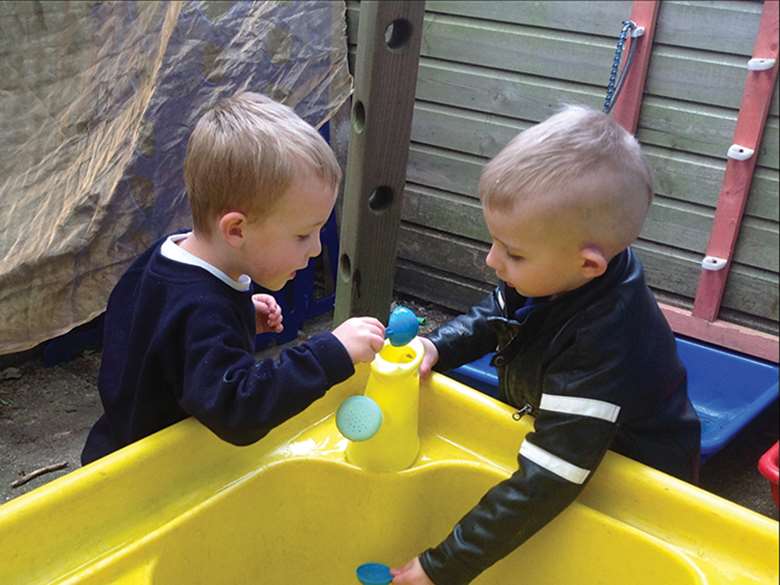Little Stars Childcare Centre
Derren Hayes
Wednesday, July 26, 2017
Being part of an academy trust helps childcare centre prepare pre-school children for the transition to formal education

- Academy trust has a co-ordinated approach to preparing children for the transition from childcare to formal education
- Shared approaches to learning across schools and nurseries help children to progress quicker
- It has closed the attainment gap for disadvantaged pupils
ACTION
When Ellacombe primary school in Torquay joined the Learning Academy Partnership, a multi-agency trust, in 2012, the partnership was quick to establish a feeder nursery. Little Stars Childcare Centre opened in September 2012 and since 2013 has been rated "outstanding" by Ofsted.
Since 2016, Little Stars has had extended nursery status with Ellacombe Academy, and from the autumn it will be operating from new premises thanks to a £1m rebuild that will see it increase capacity to 60 children aged two to four.
In addition to the investment in infrastructure, being part of an academy trust has helped Little Stars develop a co-ordinated approach to preparing pre-school children for the transition to formal education.
It has also been cited by the inspectorate in 2014 as an example of good transition practice.
The trust is made up of seven schools, three of which have pre-school provision, and all of which serve different types of communities. However, Julie Edwards, assistant head of the academy and early years lead, says the standards of provision are the same across all its settings.
"Overseeing collaboration across the trust is my role," she explains. "Our schools are in a wide range of areas, but the ethos is just the same.
"Little Stars serves an area in Torquay with a high level of poverty and there are significant numbers of children in receipt of the early years pupil premium and ‘just about managing' families."
Little Stars, like the trust's other two early years settings, uses a range of ways to engage parents to help ensure they and their children are school ready.
Parents are invited to an initial school induction meeting where they can meet teaching staff, school nurses and staff from a voluntary family-support service. Edwards says this is particularly important for parents of children who may have had additional support at children's centres, such as from health visitors, "that can disappear" at school.
"It gives them an opportunity to see what support is available at school," she explains.
The child's reception teacher will also visit the family in the home "to get to know the family".
"It is an opportunity for the parents to voice any concerns and help put them at ease," adds Edwards. "It ensures parents and teachers are on the same page and it's important for the child to see them work together. That's easier to do at home than during a busy school day."
The final transition event - a tea party in the summer term - helps give children and families the feeling they are part of the school.
If a child attends a nursery that is not part of the academy trust, a teacher from the school will visit the child to see how they are in that environment.
"The relationship between nursery and school is key to a good transition," adds Edwards.
She says the academy trust's schools and early years providers have a shared ethos on standards, such as timekeeping, that are sometimes not matched elsewhere.
"Children can struggle if they have come from somewhere that there hasn't been the same level of expectation.
"The benefit of being in the academy trust is that there is that shared language and characteristics of learning," she explains. "There are systems of learning that children use across all our schools and nurseries.
"The continuity between early years and school enables reception children to progress learning quickly because they know each other very well."
Little Stars focuses on encouraging a love of reading, having fun with numbers and holding a pencil. Developing language skills are also highly prized.
"We encourage children to speak in full sentences and there are lots of opportunities to talk and tell stories," says Edwards.
"When we talk about school readiness we emphasise communication and language - the prime areas of learning."
She says there is a common misconception among private, voluntary and independent nurseries that school readiness is all about ensuring children are able to sit still. "Actually, it is about making sure children are coming from a safe and secure starting point," she adds.
The academy trust is part of a teaching school and across the region it offers workshops and learning opportunities for other schools and early years providers. Being part of an academy trust has also helped Edwards establish new links across the education community.
"I was in Edinburgh last week to see the good work being done there with year 1 pupils. I couldn't have done that if we were a small community setting. We now look outwards rather than inwards."
IMPACT
Due to the good foundations put in place at Little Stars Nursery, the children are able to make rapid progress in reception with Ellacombe Academy consistently exceeding the national average for children reaching their "good" level of development at the end of the year.
Children who are entitled to pupil premium support have done as well or better than their non-pupil premium peers for the last three years - closing the gap for the most disadvantaged pupils.




